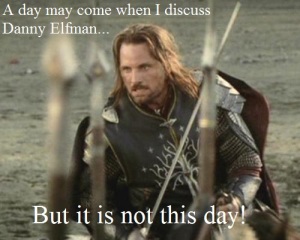When asked to think about modern classical music, we often recall film scores as opposed to string quartets. In some ways, this is a great thing. We are exposed to music of all varieties on a constant basis. But when we think of film composers, I doubt many of us could name more than two or three. Quick poll: who is your favorite modern film composer?
How many of you said John Williams? (Some of you may have said Danny Elfman…)
Of course you did. He’s only responsible for every awesome thing that’s been written in the last thirty years, right? Star Wars, Raiders of the Lost Ark, Jaws, E.T., Home Alone, Jurassic Park, Schindler’s List, Harry Potter- these are just a few of the credits on his astounding resume. And I can tell you, without a doubt, that his themes are some of the most memorable moments in music history. Like this one:
Or how about this one:
Seriously, this body of work amazing, right? Well… yes and no. I do think that John Williams has an amazing output of work, and I think that his themes are beyond reproach… for the most part. However, there is something about John Williams’ music that has been nagging at me that I feel must be addressed. Let’s listen to the Harry Potter theme, one of my personal favorites.
This is Hedwig’s theme. With just the right amount of mystical extended tonality, those unexpected accidentals (slightly too high or too low sounding notes) really give the piece a sense of bobbing through the air. It’s just a beautiful composition. But then I decided to look up my old friend Tchaikovsky, and what did I hear?
Wow, those two videos sound very similar at the beginning, don’t they? Add a couple of 16th notes in between the longer notes or Swan lake, and you’ve got yourself a movie theme. And speaking of Harry Potter, there is this awesome moment:
At about the 1:00 minute mark, things get really good. The chess match begins, and the music suddenly takes on an ominous, war-like tone. So what’s the problem? Well, I guess Gustav Holst is the problem.
At first the similarities are more subtle. Similar instrumentation, but that could be an accident, right? Well, at 4:15 Holst’s Mars picks up the pace and hits an amazing fever pitch, which sounds very much like the intense music of the chess match at 3:30. Of course, there are differences. Holst’s only uses one note for his melody while Williams’ utilizes a bit more of the scale, but the rhythmic similarity is pretty uncanny. Once again, Williams succeeds in fooling us by adding a few 16th notes. In fact, if you listen closely, underneath the rhythmic theme playing, the ACTUAL opening theme from Mars plays underneath it.
Minority Report is one of my favorite sci-fi movies, and John Williams’ haunting score is a perfect backdrop for this heartbreaking story about redemption.
Upon further inspection, we find that Mahler’s Fifth Symphony might not be an exact twin but certainly an older sibling- a wiser, more pensive soul.
There are dozens and dozens of similarities between John Williams’ work and other classical composers. (Many of them are Star Wars, but I decided to talk about a few of the less documented ones.)
So, this is where we arrive at the dilemma. Does borrowing ideas from other composers make John Williams any less of a genius? If we listen to film scores that are inspired by famous classical pieces, could we possibly develop an ear and taste for it? Could listening to John Williams make us like audiences like Tchaikovsky more, even if they don’t know why? Frankly,I like him less because of these inspirations, and here’s why. However, that exact same video could be used to defend John Williams’ compositions.
It’s not that I hate John Williams or his music. It’s just that there are so many other incredible composers out there who don’t get nearly as much credit.
Many people assume John Williams wrote the score for The Lord of the Rings, but it was, in fact, Howard Shore, the same composer as The Fly. Talk about versatility! Or we could give a hand to composer Michael Giacchino, who has done so much good work. Seriously. So much. Yet, nobody seems to know his name.
I’d like to take just a moment to talk about one of my favorite film composers, and he’s likely to be of whom you’ve never heard. His name is Joe Hisaishi, and his music is some of the most glorious, subtle work in all of cinema.

